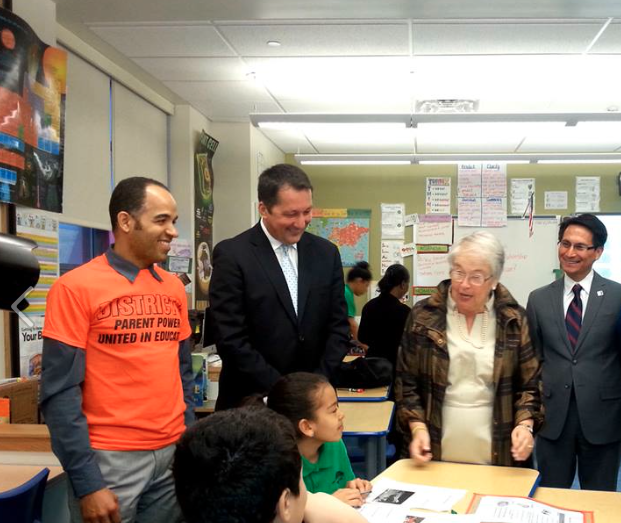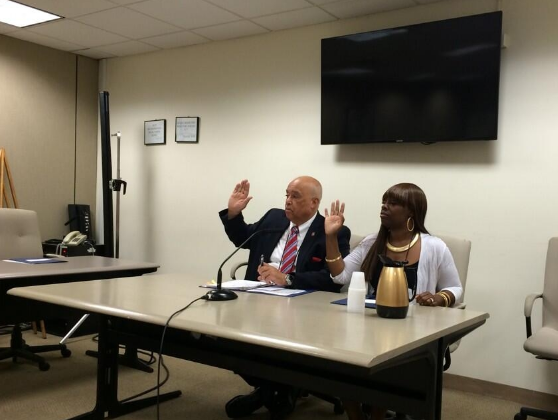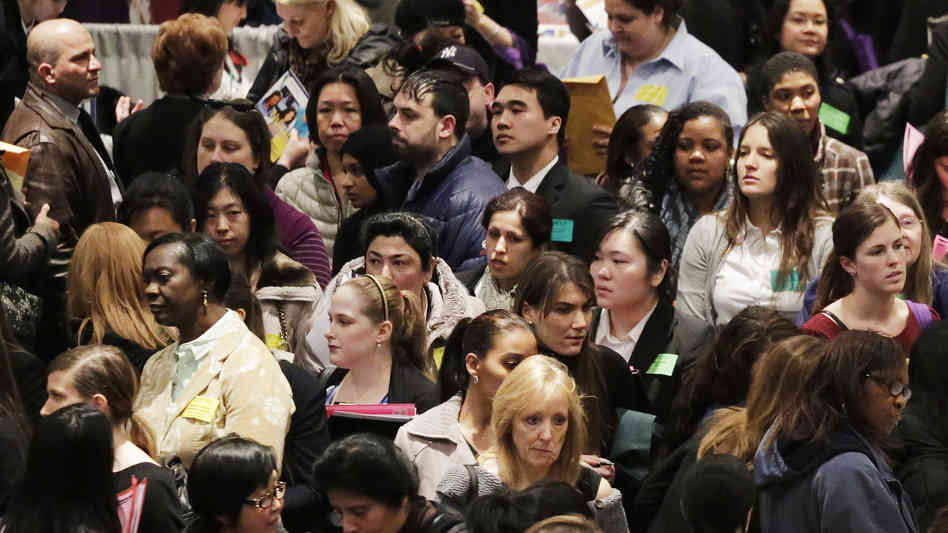Community Schools Will Succeed If Parents Are Engaged

The author, left, and Chancellor Fariña make a school visit
Last week, Mayor de Blasio announced he is ready to move on his pledge to open 100 community schools by the end of his first term by utilizing a $52 million grant to create 42 new community schools in high-needs neighborhoods.
Community schools hold the power to tackle the tale of two cities in our school system—where deep educational disparities have meant 80% of students graduating college-ready in Tribeca and only 8% in Mott Haven. The innovative model will turn schools into community hubs that bring together social-emotional, medical, adult education, recreational, and job training services, and, along with a positive school climate, can address the needs of students, families and the entire community.
As a parent of two sons, I've experienced the best of times, and the worst of times, through two very different New York City public schools. Based on my experience, I believe parent engagement is the key to making the mayor's community schools initiative succeed. In turn, the community schools initiative can serve as the guiding vision to support all public schools to succeed.
The worst of times was at PS 73 in the South Bronx, a school left to struggle and which my sons no longer attend. Under the Bloomberg administration, the school stood at risk of closing for poor performance, while being underfunded and neglected. Students, parents, teachers and staff were kept on the edge of their seats, with repeated threats of phase-out and closure. In the end, they never closed the school. But, they also never provided any additional resources or supports, and the majority of parents were shut out from any meaningful role in school improvement.
The year my sons graduated from PS 73, the Campaign for Fiscal Equity commitment, which had promised us billions of added classroom dollars for struggling schools across the state, was put on hold for a third year. I was forced to accept budget cuts, instead of high quality education for my two sons.
Why should parents have to accept that their children receive an unequal education? I didn't, and no parent should.
Now in the best of times, my sons attend the New Settlement Community School, with the community schools model that Mayor de Blasio is going to expand. The school has everything: a clinic if they have a cavity or any other health needs; strong academics; swimming, ballet, and music programs; parent workshops regarding school involvement and nutrition; and so much more—all under one roof.
My sons now get up early in the morning to play basketball in a full, well-maintained court and stay after-school for reinforcements in math and reading. I have never seen either of them more focused or motivated. The community school makes both of my sons' education complete.
The key to the success of this school, which should be applied to each of the mayor's 100 community schools, is strong parent engagement from the beginning in both design and evaluation. Unlike at PS 73, parents at New Settlement are treated as full partners. The doors are open, there is mutual trust among teachers, administrators, and parents, and constant outreach is made to parents to get us involved.
In the mayor's initiative, each school will receive a full-time resource coordinator. They will recruit partnerships and resources for the school, working with the principal and school community to create a well-designed and effective community school. I strongly believe that this is a job for people with passion—for individuals who truly believe transforming education is possible.
The engagement of parents must be a large part of measuring the success of these resource coordinators. They must meet parents where they are, and reach out especially to parents who aren't involved in the school through home visits, phone calls, community meetings, whatever it takes. They should listen to parents' ideas, their anxieties and their vision. Parents should be offered clear pathways to become leaders in the school and the community.
My optimism for real improvements in our education system is now revived. The community schools model transformed the education of my two sons, and now our mayor and chancellor are committed to expand this model and move the public school system in a direction that is focused on educating the whole child.
***
Jose Gonzalez is a parent leader with United Parents of Highbridge and the NYC Coalition for Educational Justice. His two sons attend the New Settlement Community School in the South Bronx.
At A Hearing On Veterans Affairs, Missed Opportunities

MOVA Commissioner Terrance Holliday & his deputy at Monday's hearing (Mario Figueroa of United War Veterans)
On Monday, the New York City Council Committee on Veterans, chaired by Council Member Eric Ulrich, held an oversight hearing on the Mayor's Office of Veterans Affairs (MOVA) and its role in serving New York City's roughly 200,000 veterans.
Since Mayor de Blasio was elected in November, there have been renewed discussions in the veterans community regarding MOVA, its resources, and its direction. Beside awaiting the mayor's decision on an appointment to head MOVA, the community has been lobbying the administration to allocate $250,000 dollars in the new budget to continue MOVA's benefit counselor initiative. The City Council also asked the mayor for additional funding toward mental health, employment, and legal assistance services for veterans.
So the lead-up to the first oversight hearing of MOVA in a number of years was filled with anticipation and concern. Would this be a hearing about MOVA's role in helping veterans or a popularity hearing from those who want Mr. Terrance Holliday to stay as MOVA commissioner? It turned out to be both.
At the packed hearing, Commissioner Holliday gave fairly standard testimony by addressing all the good things MOVA does. He spoke on how MOVA provides "advocacy, referral and short-term case management services to veterans." He talked about MOVA's coordination of the city's Veterans Advisory Board (VAB) and the establishment of a Women's Advisory Committee. He talked about the Indigent Burial Program, the City's Agency Liaisons; the office's veterans clothing initiative and the office's coordination of City Services.
Despite the commissioner's presence, this hearing was no different from others. The commissioner concluded his remarks and Council Member Andrew Cohen started asking a few questions. His question regarding the veteran liaisons at city agencies and their periodic training should warrant a future hearing - no one followed up by asking what the liaisons were trained in, who trained them, or even how they could verify the training actually took place.
However, it was when Council Member Paul Vallone asked the commissioner for his thoughts on his budget that everyone really leaned in. The community has known for many years that MOVA is underfunded. Every director or commissioner I have known has had to deal with the problem of underfunding. So when the Commissioner was asked if he was comfortable with his budget and what the Council could do to help, he incredibly stated that he has not needed money to get things done and that he obtains needed resources from other city agencies.
This comment came back to hurt him on a couple of occasions. When Council Member Vallone asked if MOVA has offices in the outer boroughs, the commissioner stated he only has an office of four individuals, at which point Council Member Vallone brought him back to his point of the office needing more money.
This happened again when the discussion turned to the benefit counselors and Council Member Vallone asked what the plan was when the Robin Hood funding that supports the counselors ends. The commissioner's response was: "I'm still thinking about it, still trying to figure it out, how to work it out."
Again, Council Member Vallone brought him back to the office needing money.
And as if to drive home the point, the Council Member asked for the current budget breakdown between salaries and services. The commissioner's response was that just about the entire budget goes to salary.
What the committee members and everyone in the room wanted to hear the commissioner say was that he wants and needs more money – not that he has to ask other agencies for help or that he would take money if it was given to him. How can MOVA provide more services and better assist veterans without better funding?
The commissioner's continued reiteration of getting it done without additional funding, but then talking about expanding services was conflicting and is detrimental to how MOVA can better help veterans. Sadly, this was then compounded by the commissioner leaving the hearing after he finished his testimony.
The remainder of the hearing consisted of several panels made of up people who gave testimony on how MOVA can better address the needs of veterans; why the city needs to fund the benefit counselors program; or that the commissioner is doing a great job. This last one was apparent as Council Member Ulrich asked all who testified to rate MOVA's performance on a scale of 1 to 10 (10 being the best) and several individuals rated it a 10. This rating was more out of fondness for the commissioner and wanting to see him stay on than the role MOVA serves in helping veterans.
If the commissioner had stayed, he would have seen that the majority of those who testified agreed that MOVA's current mission as defined in the City Charter is too broad and too vague and everyone who testified agreed that MOVA needs more money.
The United States has been at war for over a decade and while veterans are shown respect by our local elected officials, we're still trying to find a seat at the political table. Testimony from Coco Culhane of the Veterans Advocacy Project said it best: "The Mayor's budget proposal, which offered a paltry few extra dollars to MOVA, sent a message about the priority of veteran's issues for this administration."
Veterans need help with housing, education, jobs, health care, and, most of all, knowledge of the array of programs that are available to them. MOVA still has the potential to do great things, but it is underfunded. Speaker Melissa Mark-Viverito and Council Members Ulrich and Vallone represent a change in direction - and they showed that with their budget commitments to veterans services. As the son of a veteran, Mayor de Blasio needs to get onboard though. MOVA is, after all, the "Mayor's Office of Veterans Affairs." I know we can do better.
***
Joe Bello served 11 years in the US Navy/Naval Reserve and has been a veteran's advocate in New York City for almost two decades. He is the founder of NY MetroVets.
The Crucial Role of Year-Round, Part-Time, Private-Sector Employment

Job seekers (Mark Lennihan/AP)
Advocates for the poor rallied last month for additional summer youth jobs. City Councilman Jumaane Williams said many youth in the city have to decide between getting a legitimate job or turning to drug dealing to make money. "It is unfair to ask young people to make the correct choice when we give them no choice," Williams said.
While there is something positive about summer employment, much more substantial benefits come from year-round part-time employment. As Councilman Williams points out, teens from poor families have substantial consumption needs, but these needs are year round. Unfortunately, the teen employment rate in 2013 was little more than half what it was fifteen years ago as firms shifted to young adults and retirees. Nationally, only one in ten black teenagers from low-income households is employed. While I strongly endorse a minimum wage increase, there is some evidence that it may accelerate this shifting of employment to older workers.
Legal employment for young men reduces the temptation to engage in illegal activities. Less discussed, is the impact of joblessness on young women. Without paid employment, many must rely on male partners; men who will demand sexual favors that put these young women at risk for sexually transmitted diseases and unwanted pregnancies. These problems are most pronounced for disadvantaged black teen women whose incidence of gonorrhea and chlamydia are at least seven times the rate for white teen women. Each year in New York, 13 percent of black teen women becomes pregnant - a rate 3.5 times higher than the white rate. While paid employment is not a magic bullet, it will help many young women avoid these risks.
Continuous teen employment has other benefits. The Community Service Society recently documented the substantially higher graduation rates for black and Latino students who attended Career and Technical Education (CTE) High Schools. These CTE programs not only prepare students with the academic skills necessary to succeed in the world of work, but also provide mentoring and the work skills needed, including team work, work discipline, and communication skills. Many of these same skills are developed through paid teen employment.
There are already a number of programs that aid disadvantaged youth. Year Up is a successful program to prepare promising students for demanding occupational programs that lead to backroom employment in the financial sector. Other programs focus on disconnected youth who are neither in school nor employed. None of these programs, however, focus on high school students who are at risk of not graduating. There is a crucial need to introduce to the world of private-sector paid employment this large group of disadvantaged students before they become disconnected from school and work.
There are a number of ways that government support can move significant numbers of students into year-round part-time private-sector employment. In the 1990s, the government shifted many long-term welfare recipients into the workforce; and continues to have a number of programs that move ex-offenders into paid employment. As in both cases, a critical component of work-readiness programs is preparing participants for the behavioral traits private-sector employers require; and ongoing counseling to help facilitate effective employment.
Besides the work readiness and ongoing counseling, other modest incentives can be given to the national retail chain stores and fast food establishments to induce them to increase their teen employment. In addition, government should find ways to induce firms that provide summer employment to extend, for a modest proportion, employment into the school year. Once hired, employment counselors can help students to balance work and school and to develop strategies to reduce risky sexual behavior. By providing soft skills, mentoring, and spending money, year-round employment could move disadvantaged youth forward.
***
by Robert Cherry, Stern Professor of Economics, Brooklyn College and the Graduate Center of CUNY
***
Have an op-ed idea or submission? Send it to Executive Editor Ben Max: This email address is being protected from spambots. You need JavaScript enabled to view it.




